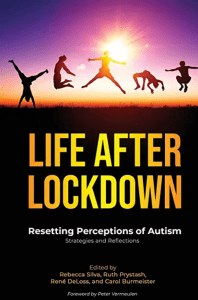Computer gaming and COVID
Published by Tony Attwood on
Computer gaming and COVID
The following article is Tony’s chapter from the new book:
Life After Lockdown: Resetting Perceptions of Autism Strategies and Reflections
Edited by Rebecca Silva, Ruth Prystash, Rene DeLoss, and Carol Burmeister (Foreword by Peter Vermeulen)
Available to purchase here
The past year has marked us as one of the only generations to experience a global pandemic. The pandemic kept people at home, something that suited many autistic individuals. But it also limited the opportunities for social and emotional growth for autistic teens and young adults, and one of the obvious outlets became computer games. These games were already intensely important to many autistic youth, but now they became more so, as there was little else to occupy their minds and their time. Computer games can be beneficial, but they can also be addictive. This is a story that needs to be told, because nobody else is talking about it.
COVID’s impact on the autistic teen or young adult
Many individuals have begun displaying an increase in routines and rituals, heightened sensory sensitivity, and more engagement with special interests. These are all ways of coping with anxiety. People have been cooped up together for the past year, which can be difficult for a person with autism who craves solitude. There may even be anxiety about what will happen when we begin to have more face-to-face contact and are forced to endure crowds again.
There is a misconception that people with autism lack empathy. The opposite is actually true: Autistic individuals are often acutely aware of other people’s mental states. The news speaks of a killer virus and the rising numbers of dead; children worry about their family members’ health. There has been more free time at home this year for the anxiety to percolate and one way to alleviate that anxiety is the computer game.
Computer gaming—a perfect fit for autism
There are a number of factors that make computer games extremely popular with people on the spectrum. Gaming provides a sense of achievement and identity. It allows you to show your capabilities independent of autism. The main issues of autism are social-conversational, but in gaming you have no real socialization and you have no conversation, so you have basically bypassed autism. Gaming is a natural talent because it suits the autistic cognition. However, it also involves considerable practice. A person can become a master of a skill that requires great ability but also practice. It is the same for a child with computer games. They are talented at computer games, and are motivated to practice. If you want to measure the intelligence of an autistic child, watch them play computer games. The game bypasses their autism, they are highly motivated, and you can see how quickly and effectively their brain works.
If you are not good socially and you are not good at sports, your intellect is very important to you, and you want to prove how smart you are. You want to demonstrate your intelligence and you want other people to appreciate that intelligence. With gaming you have a sense of achievement that is truly gratifying, especially as it is valuable to your peer group.
Autistic teens are searching for identity. Who am I? Why am I here? What is the meaning of life? Where do I fit in? I know I’m supposed to be like everyone else, but I’m not. I want a sense of identity and self-worth that is defined by something that is valued by my peers. The computer game does that. It gives a sense of identity to someone who is searching. The computer game becomes a way of fitting in. It becomes your identity when you have few ways to define that identity. And autism can make a person very lonely. Without social skills, it is sometimes hard to fit in to most same-age groups. Bullying and being excluded can leave autistic teens feeling isolated, while gaming provides a connection with fellow gamers who actually seek you out, rather than shun you.
Computer games give you immediate feedback. As many as 75% of those with ASD also display characteristics of ADD and ADHD. Computer gaming suits those characteristics, as it is based on immediate feedback on one’s performance without any waiting, which autistic people often dislike. Unlike school, where you may be waiting on feedback from a teacher, the game provides immediate feedback.
People are excited to see you online and that kind of genuine, deep welcome is intoxicating to someone with autism. Someone in your peer group actually wants to know you, and is pleased that you are there. Rather than the students who sometimes bully and tease and reject and humiliate, these gamers want to know you and are proud to be your friend. They give you compliments and admiration. But more than that, with your gaming skills, you also become a teacher to some, a mentor to others. You advise them. You are wise. You are talented. You are someone special.
In e-sports, a subgroup of gaming, there are leagues with teams and supporters; logos and colors; managers and favorite players. Players are bought and sold. There are e-sport competitions held in convention centers with thousands of people watching gamers. And in this world, you, the autistic individual, are the person the team wants to recruit. You are a hero in that world. Finally, you have a social network where you shine.
Gaming as a coping mechanism
During COVID, anxiety and depression increased for many people, including people on the spectrum. A computer game is a thought blocker for anxiety and depression. When you are engaged in the game, you don’t feel anxious and you don’t feel depressed. Instead, you suppress and compress your thoughts and feelings. Computer games are more powerful than medications or cognitive behavioral therapy because they encourage the classic autistic characteristics of avoidance and suppression. When you are playing the game, you are in a bubble. Your problems disappear and you don’t care about anything else, but when you switch off the game, those feelings come back. Parents become frightened to see how angry their child becomes when asked to turn off the computer. What is actually happening isn’t really anger: It is the fact that their powerful feelings have not been dissolved or resolved. Once the game is gone—boom! The feelings are back, and they flood you with fear and despair.
A substitute for social interaction
In autism social emotional reciprocity is a core issue. In a computer game, you don’t have a real conversation going on. You don’t have to worry about reciprocity, you don’t have to read body language, and you don’t have to be involved in social chit-chat. One of the interesting things is that there are often chat lines in computer games, and they provide a means to communicate through typing, rather than talking. Clinically, that can be very valuable. When a client sends me an email, I may receive far more information and insight into the individual’s world than I do in person, because it involves typing, not talking. There is a greater fluency and disclosure of thoughts, feelings, and revelations of the self through typing, rather than talking.
The games have very clear and simple rules that aren’t like social rules. Social rules are inconsistent and complex, and there are always exceptions. Neurotypical kids do things that that are against the rules and get away with it, even though you’re not supposed to get away with it! But in gaming, there are simple rules that are always enforced. There is no inconsistency and no uncertainty, so you are secure in the rules of the game.
A sense of pleasure and enjoyment
If you ask a neurotypical about the greatest moments of excitement and joy in their life, it usually involves another person–giving birth, getting married, falling in love. But with autism, other people can be a source of confusion, so pleasurable memories rarely involve them. Computer gaming, on the other hand, gives you experiences of pleasure and enjoyment when there are very few in your life. This is incredibly intoxicating. Gaming is addictive because it feeds into pleasure-seeking and enjoyment. For someone who may have few pleasures in life, experiencing such a high level of excitement—perhaps the greatest enjoyment you have ever received—is euphoric.
Creating an alternative world
In the real world of daily life, the teen with autism is often not respected or included. But here in the computer game, you are in a world where you are both respected and included. The special interests of people on the spectrum are often an attempt to find a world in which to belong. Anime, Pokemon, Manga–another culture, another country, another time in history where you fit in. Science fiction–you go to another planet where you are recognized and valued. The game creates an alternative world where you have a sense of belonging. The real world may not value you or respect you, but in this world you are remarkable, and that’s why you want to stay.
Avatars are virtual selves that you can create in a computer game. An avatar allows you to experiment with personality, analyzing the interests and people who are important in your life. This is what most teenagers do in the real world. I’m going to be an adult, so what kind of adult am I going to be? Who do I value, who are my heroes, and can I borrow some of their characteristics? In a computer game you can experiment with that even further. If you’re concerned about your weight, your avatar is slim; if you’re concerned that you’re not smart enough, then your avatar is a genius. It is very powerful.
The dangers of computer gaming
Immersion into computer gaming can mean that individuals are not learning to cope with emotions. Instead, they’re learning to avoid them. They are compressing and suppressing, and are not processing their feelings appropriately. This means that when they start playing the games in earnest, their emotional maturity freezes and levels off. Emotional regulation is stunted. Individuals learn to rely on the game rather than the actual social skills which will serve them in the real world.
When we look at the long term effects of gaming, we see medical issues. Individuals become overweight, with poor eating habits. Junk food is quick and easy while you are on the computer. Some individuals will spend enormous amounts of time online—from 10- 16 hours per day. There is a lack of exercise and exposure to sunlight, so health effects arise.
It is also very disruptive to sleep patterns. One of the effects of extended screen time is that a person’s thoughts increasingly spiral once the game is turned off. Thoughts become incoherent and chaotic, and sleep becomes more and more elusive. That’s why there should be no screen time for one to two hours before bed. In autism, sleep is always been a problem, from infancy on through senior adulthood. Sleep is important for processing intellectual information and processing emotions. When you have a good night’s sleep, inappropriate behaviors diminish. With too little sleep, the opposite is true.
One of the inherent dangers in gaming is a potential tie-in to gambling. In computer games there are commodities called loot boxes. These loot boxes pop up during a game, offering the opportunity to purchase something that may or may not contain useful items. Most boxes have ordinary items, but the gamer will continue to buy them, lured by the possibility of scoring something big. The odds of it having what it advertises are very rare, but the possibility keeps gamers buying more, and so gambling becomes embedded in games. Parents should be aware of this connection, as it is one more avenue to addiction.
When gaming becomes an addiction
The computer gaming industry has the potential to rob us of some very bright minds, who may get caught up in the addictive side of gaming. When teens begin to avoid things that were recently part of their routine, there may be a problem. If you tell your teen to get off the computer for lunch and they become incredibly agitated, avoiding lunch in order to play the game—that’s a worry. If they become upset when a legitimate request interferes with access to the game, then the depth of engagement is now of considerable clinical concern. Their world revolves around the number of hours they spend on the game, and they become agitated when other activities interfere. For example, you used to have evening meals as a family, spending time together. Now the teen arrives at the table at the last moment, bolts down food, and then, boom. Gone. No conversation. No engagement. The individual withdraws from a variety of activities that used to be important for the family and enjoyable for themselves. The game is taking control. This is common in addiction: instead of the person controlling the game, the game is controlling the person.
One of the first casualties of any addiction is truth. The individual will hide their actual time online, like an alcoholic hides their alcohol. They will also have access to games on their phones. Gaming should absolutely be included in the same category as alcohol and drugs for individuals with autism. These individuals struggle, not with autism, but with emotional regulation. Because the game is so good at moderating intense emotions, they are reluctant to switch to anything else.
Dealing with the addiction
One thing that parents should not do is take away the game as punishment. The games provide the teen or young adult with an identity, coping strategies, a social network—what they live for. If adults remove this without providing the child with other coping mechanisms or alternative activities, this ends up being, not punishment but revenge. Parents will end up escalating the punishment from a day to a week to the threat of totally removing the computer, and the teen will respond with defiance and anger. It can quickly escalate into a civil war which no one wins.
If we want to address the behavior constructively, it is important to carefully identify the issues of behavior management or encouragement of chores or other commitments. There must absolutely be consequences, but they must be appropriate. For example, if a teen does something that upsets his sister, an appropriate response might be to have him take responsibility for one of her chores for a week. The time that is spent on that chore would have been spent on the computer, so it is a means of restricting access through teaching an appropriate replacement. It is possible to use the computer as a reward. For example, if the child does their homework, they can have an extra half hour on the computer. This uses the computer as a reward or an encouragement, rather than as punishment. It also teaches a part of growing up. You want more time on the game, but you’ve got to do your chores. That’s life.
When a parent suspects addiction, they can use logic to deal with it. Get a big piece of paper and list the positives and negatives of computer games with the individual. The positives are that it helps manage emotions and it makes the child popular. So how can we help the individual achieve these things outside the game? We can find more conventional and diverse ways of achieving those things, initially in addition to the computer game and eventually as alternatives. Next list the negatives: being overweight, spending huge amounts of time on the game and nothing else, the lack of honesty, and the lack of constructive ways in their lives to learn to deal with emotions. Help the individual compare these lists and set goals.
In terms of strategy, first get an accurate accounting of the amount of time spent gaming. Instead of aiming for an unrealistic goal, like an entire game-free day, try for something more reasonable. For example, start with reducing time by 15 minutes every day for three weeks. If successful, then decrease by 15 more minutes for three more weeks. Use small steps. Parents must provide alternatives that bring pleasure to the child, like being outdoors or spending time with pets. Families must also try to help the individual increase their social network through constructive means so the individual is actually learning to relate and manage conflict.
There are currently few treatment options for addiction in autistic individuals. Therapy for addiction needs to develop expertise, theoretical models, and a whole range of strategies for gaming addiction, especially for autistic individuals. We need psychiatrists and psychologists who are aware of this and work to modify therapy to accommodate the autistic way of thinking.
Final thoughts
As we continue to deal with the effects of the current pandemic, it’s important to realize that many of our brightest autistic individuals are going into the medical and research fields. These individuals, with their logical brains and skill at analyzing systems, have the ability to understand the behavior of a virus and can use their intellect to help develop cures. The intense focus of which they are capable allows them to tolerate 18-hour days in a lab. Instead of looking at a computer screen, they are looking into a microscope. Let’s hope that we can guide them to those labs, and show them that their brilliance is not only appreciated, but desperately needed, and that they are indeed invaluable members of society.


